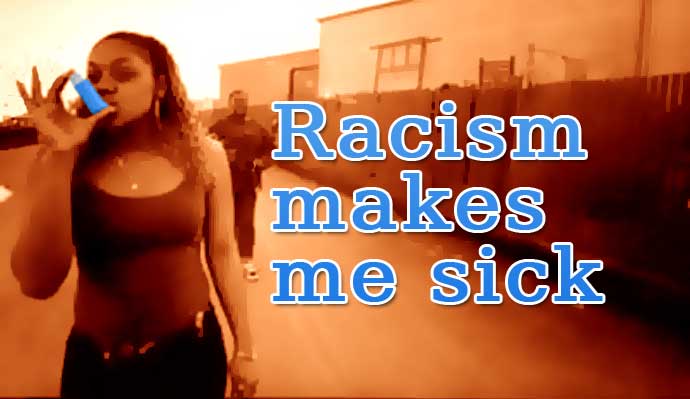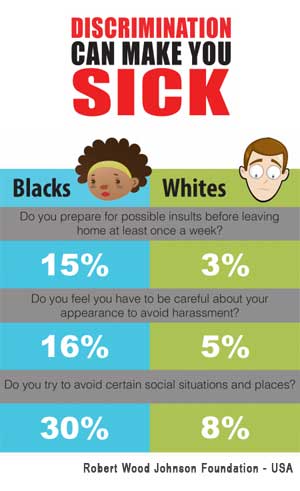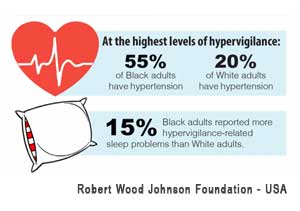Racism makes me sick
Any type of stress can impact health, but none may be quite as toxic as the tension and anxiety people experience when they fear that they will be discriminated against, reveals a study in the USA

Jessie Daniels Racism Review 27 January 2014

There's a growing body of evidence that links the experience of racism with poor health and illness. Recent, ground-breaking research further confirms this.
Any type of stress can impact health, but none may be quite as toxic as the tension and anxiety people experience when they fear that they will be discriminated against, reveals a groundbreaking new study led by Margaret Hicken, PhD, a Robert Wood Johnson (RWJF) Health & Society Scholar (2010-2012).
Working with a team that included David R. Williams, PhD, a veteran disparities researcher and head of the RWJF Commission on Building a Healthier America, and RWJF Health & Society Scholars Hedwig Lee, PhD, and Sarah Burgard, PhD, Hicken worked across disciplines to uncover several of the many ways that racism gets under the skin. "This research grew out of conversations with other Robert Wood Johnson Foundation scholars with backgrounds in sociology and epidemiology," explains Hicken, who focuses on social demography and public health.
"Sociologists have a different way of looking at how people respond to discrimination on a personal level and what it's like to live in a country where the media portrays your group in a certain way. Even policy-makers in the United States sometimes speak in code because ours is a racialized society," Hicken says.
Using survey results from the Chicago Adult Community Health Study, a population-representative sample of 3,105 people, the team conducted two studies that measured the possible health effects of remaining hypervigilant about encountering racism when engaging in simple, everyday activities.
Health and the Stress Response
The first study was "'Every Shut Eye, Ain't Sleep': The Role of Racism-Related Vigilance in Racial/Ethnic Disparities in Sleep Difficulty," published in the June 2013 issue of Race and Social Problems. The results suggested that Black, but not Hispanic, adults were most likely to maintain high levels of racism-related hypervigilance (also called anticipatory stress), and toss and turn during the night. The Black adults reported 15 percent more hypervigilance-related sleep problems than the White adults.
Racism is a stressor than can affect health in three ways: mental, behavioral, and physical.
The second study revealed far more striking differences among racial groups. In the article, "Racial/Ethnic Disparities in Hypertension Prevalence: Reconsidering the Role of Chronic Stress," published online November 18 in the American Journal of Public Health, the team reported large differences in rates of hypervigilance and hypertension between Black and White study participants, and only a small difference among Hispanics.
Not only were the Blacks surveyed more likely to be hypervigilant about experiencing discrimination, that hypervigilance may have contributed to significantly higher levels of hypertension in them. At the lowest levels of hypervigilance, Black and White study participants had similar levels of hypertension. However, at the highest levels of hypervigilance, 55 percent of Black study participants had hypertension while 20 percent of the White study participants had hypertension.

The study findings may contribute greatly to the understanding of differences in health between racial groups, because disparities in hypertension are considered a significant contributor to health disparities in America.
The Racism/Hypertension Link
"We think that the chronic activation of the biological stress response system that takes place when a person anticipates a negative event like encountering discrimination is what contributes to the higher rates of hypertension among the Blacks in our study," Hicken says.
After controlling for variables such as income, gender, age, and socioeconomic status, study respondents' feelings were measured through questions that included:
In your day-to-day life, how often do you do the following things: (a) try to prepare for possible insults from other people before leaving home; (b) feel that you always have to be very careful about your appearance to get good service or avoid being harassed; and (c) try to avoid certain social situations and places.
The researchers wrote, "the anticipatory nature of vigilance sets it apart from traditional notions of perceived racial discrimination. For decades, a large body of scientific and lay literature has provided evidence of the pervasive consequences of interpersonal and societal discrimination. In qualitative studies, social scientists often report on the way Blacks continually think about the potential for discrimination."
"Overall, the work shows that in cases where racism-related vigilance is low or absent, Blacks and Whites have similar levels of hypertension. But when people report chronic vigilance, the rates in Blacks rise significantly. They rise a little in Hispanics, but not at all in Whites," Hicken explains.
"For our next study," she adds, "we are going to expand the questionnaire to gather better data and explore how or if the impact of hypervigilance can be mitigated."
Originally posted at Robert Johnson Wood Foundation.
 Hepatitis C rising for First Nations people
Hepatitis C rising for First Nations people
 Racism, even in healthcare
Racism, even in healthcare
 Gutting the Racial Discrimination Act: Ray Jackson
Gutting the Racial Discrimination Act: Ray Jackson
 Racial Discrimination Act - Submissions & Information
Racial Discrimination Act - Submissions & Information
 The 'Top Five Acts' of racial discrimination in Australia
The 'Top Five Acts' of racial discrimination in Australia

